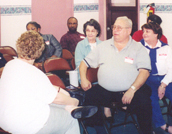Building Your Health Care TeamPowerful Patient, 2009 Week 3Host: Joyce Graff, http://powerfulpatient.org, editor@vhl.org 800-767-4845
Joyce Graff speaks with Sarah from Minnesota about her experiences building her own health care team and helping others in Minnesota to do the same. Doctors, friends, family, and others dealing with the same disease, all are important to your well-being.
About Our Guest
Sarah is a health care professional herself, and is chairman of the Minnesota Chapter of the VHL Family Alliance, an international support organization for people dealing with von Hippel-Lindau (VHL).
About VHL
Von Hippel-Lindau is a familial cancer syndrome – a tiny little misspelling in one gene, as if there were one word misspelled in a chapter in a book. People who carry this flaw in their genome are at increased risk for tumors of the retina, brain, spinal cord, kidneys, pancreas, and adrenal glands.
There is no cure for VHL, and treatment is usually surgery to control tumors, keeping them from growing into more serious problems. Over the past fifteen years, this Alliance of physicians and patients has developed strategies for screening, that is proactively checking for issues that might arise, hoping to find them early. Early detection allows the patient and the health care team time to develop a strategy for dealing with the issue as constructively as possible, preserving organ function and avoiding the worst consequence of cancer.
http://vhl.org
About developing your health care team
Your friends and family are your first support group. In addition, it is very helpful to be able to interact with others who are dealing with the same issues you are. A health care team begins with a primary care physician (PCP) or general practitioner (GP) who is willing to work with you to arrive at a correct diagnosis. The process may take one or more specialists, but hopefully you will have the help of this GP in directing you to the specialist(s) most likely to help, coordinating all the information gained from specialist visits, and working to derive the right answer from the information accumulated. Your role is to be a good reporter of your symptoms, and to follow through on the recommendations of your GP.
It is usually helpful to keep a log of your symptoms, and also to keep track of all the doctor visits, test results, and radiology reports, so that you have a complete record yourself. Especially when you are visiting doctors in different hospitals, having a copy of your record may be essential, as you may need to facilitate communications among these physicians.
A correct diagnosis is usually the first challenge. Until you have a correct diagnosis, it is difficult to know how to treat any condition. The internet offers to doctors and to patients the richest source of information to support the diagnostic process.
Once you have that diagnosis, you should educate yourself about your condition, and learn how to manage your health. Even when there is no cure, there is still hope, and finding others who are coping with this condition and learning from them is important to maintaining your own health.
The National Organization for Rare Disorders is a good source of information about the many rare diseases. They maintain a database of symptoms which is licensed to a number of search engines on the internet, including WebMD. They also maintain an online discussion group, where you might find suggestions for diagnoses, and where you will find others with the same diagnosis.
http://www.rarediseases.org
About Support Groups
Some people are eager to attend their first support group meeting, others are reluctant, or perhaps afraid of what they may find. You will meet people with conditions more severe than your own, and people with less serious conditions. But most important, you will meet people who understand at a visceral level what you are going through. And that is priceless. I have now visited with people with VHL in 26 countries, sometimes in languages I did not speak or understand. But pointing to body parts and hugging one another are a universal language that nourishes and heals. I have to say that I have been privileged to meet some pretty wonderful people – people who understand what is truly important in life, who know how to laugh no matter what, and who have enriched my life beyond measure.
|

